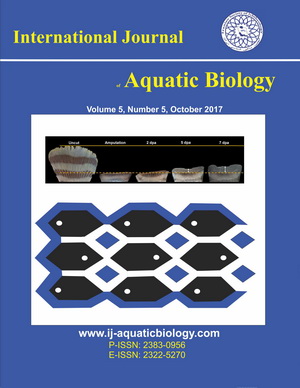Synbiotic of alginate, spirulina water extract, and Lactobacillus bulgaricus promotes survival, growth, and immune parameters based on the gene-expression of Litopenaeus vannamei in low-salinity
Downloads
Synbiotics containing prebiotics and probiotics are commonly applied in aquaculture, which serves mutual benefits. This study focused on applying alginate, spirulina water extract (SWE), and Lactobacillus bulgaricus probiotics in Litopenaeus vannamei supplementation feed via oral administration at low salinity (1 ppt). The survival rate, growth, and biomass were determined as well as the immune-related gene expression of ProPhenol Oxidase (PO), Superoxide Dismutase (SOD), Lipopolysaccharide Beta Glucan Binding Protein (LGBP) were assessed. Gene-related salinity stressors, namely insulin-like growth Factor (IGF) and Heat Shock Protein (HSP), were also determined. The factorial design with two factors was applied (supplemented and non-supplemented; 1 ppt and 30 ppt mediums) and replicated thrice. 1,000 shrimps (500 ind.m2) at the initial weight of 0.2±0.05 g were reared in the semi-mass culture at 2 tons medium for 56 days. Growth was monitored weekly. The results show that shrimp fed supplementation of (Alg 3.0 g.kg-1 + 5.0 mg SWE.kg-1) in 1 ppt medium (P<0.05) reached the best survival rate, biomass, and gene expression (PO, LGBP, HSP, and IGF), except Lectin. These prebiotics of macro and microalga from Indonesia's tropical coast supported the environmentally friendly and sustainable approach. Promising a noteworthy future in culturing L. vannamei in low salinity.
Downloads
Al-Subiai S.N., Jang I.K., Bae S.-H., Yoon H.-s., Hussain S., AlNuaimi S., Al-Foudari M. Al-Hasan E. (2025). Enhancing the performance of Litopenaeus vannamei nursery and grow-out by modifying Mg/Ca ratios in biofloc systems using low-salinity groundwater of Kuwait Desert. Aquaculture, 594: 741405.
Azhar N., Yudiati E. (2023). Outbreak simulation of Litopenaeus vannamei recovery rate with oral alginate and spirulina diet supplementation against Vibrio parahaemolyticus AHPND. Aquaculture International, 31(3): 1659-1676.
Bahi A., Ramos-Vega A., Angulo C., Monreal-Escalante E. Guardiola F.A., (2023). Microalgae with immunomodulatory effects on fish. Reviews in Aquaculture, 15(4): 1522-1539.
Chen K., Li E., Xu C., Wang X., Lin H., Qin J.G. Chen L. (2015). Evaluation of different lipid sources in diet of pacific white shrimp Litopenaeus vannamei at low salinity. Aquaculture Reports, 2: 163-168.
Cheng W., Liu C.-H., Kuo C.-M. Chen J.-C. (2005). Dietary administration of sodium alginate enhances the immune ability of white shrimp Litopenaeus vannamei and its resistance against Vibrio alginolyticus. Fish and Shellfish Immunology, 18(1): 1-12.
Daba G.M., Elnahas M.O., Elkhateeb W.A. (2021). Contributions of exopolysaccharides from lactic acid bacteria as biotechnological tools in food, pharmaceutical, and medical applications. International Journal of Biological Macromolecules, 173: 79-89.
Esparza-Leal H.M., Ponce-Palafox J.T., Cervantes-Cervantes C.M., Valenzuela-Quiñónez W., Luna-González A., López-Álvarez E.S., Vázquez-Montoya N., López-Espinoza M., Gómez-Peraza R.L. (2019). Effects of low salinity exposure on immunological, physiological and growth performance in Litopenaeus vannamei. Aquaculture Research, 50(3): 944-950.
FAO. (2024). Fishery and aquaculture statistics – Yearbook 2021. FAO Yearbook of Fishery and Aquaculture Statistics, Romehttps://doi.org/10.4060/cc9523en
Feng H., Wang X., Zhou H., Mai K., He G., Liu C. (2023). Involvement of insulin-like growth factor binding proteins (IGFBPs) and activation of insulin/IGF-like signaling (IIS)-target of rapamycin (TOR) signaling cascade in pacific white shrimp, Litopenaeus vannamei exposed to acute low-salinity. Aquaculture Reports, 30: 101627.
Gao Y., Li J.N., Pu J.J., Tao K.X., Zhao X.X., Yang Q.Q. (2022). Genome-wide identification and characterization of the HSP gene superfamily in apple snails (Gastropoda: Ampullariidae) and expression analysis under temperature stress. International Journal of Biological Macromolecules, 222: 2545-2555.
Gómez-Anduro G.A., Barillas-Mury C.-V., Peregrino-Uriarte A.B., Gupta L., Gollas-Galván T., Hernández-López J., Yepiz-Plascencia G. (2006). The cytosolic manganese superoxide dismutase from the shrimp Litopenaeus vannamei: Molecular cloning and expression. Developmental and Comparative Immunology, 30(10): 893-900.
Hidayati J.R., Yudiati E., Pringgenies D., Oktaviyanti D.T., Kusuma A.P. (2020). Comparative study on antioxidant activities, total phenolic compound and pigment contents of tropical Spirulina platensis, Gracilaria arcuata and Ulva lactuca extracted in different solvents polarity. E3S Web of Conferences, 147: 03012.
Jalbout M., Bouaouina N., Gargouri J., Corbex M., Ben Ahmed S., Chouchane L. (2003). Polymorphism of the stress protein HSP70-2 gene is associated with the susceptibility to the nasopharyngeal carcinoma. Cancer Letters, 193(1): 75-81.
Kongchum P., Chimtong S., Prapaiwong N. (2022). Association between single nucleotide polymorphisms of nLvALF1 and PEN2-1 genes and resistance to Vibrio parahaemolyticus in the Pacific white shrimp Litopenaeus vannamei. Aquaculture and Fisheries, 7(4): 373-381.
Li E., Arena L., Lizama G., Gaxiola G., Cuzon G., Rosas C., Chen L., Van Wormhoudt A. (2011). Glutamate dehydrogenase and Na+-K+ ATPase expression and growth response of Litopenaeus vannamei to different salinities and dietary protein levels. Chinese Journal of Oceanology and Limnology, 29(2): 343-349.
Li Z., Chang T., Han F., Fan X., Liu W., Wu P., Xu C., Li E. (2024). Effects of myo-inositol on growth and biomarkers of environmental stress and metabolic regulation in Pacific white shrimp (Litopenaeus vannamei) reared at low salinity. Comparative Biochemistry and Physiology Part D: Genomics and Proteomics 50: 101216.
Liu L., Cai X., Ai Y., Li J., Long H., Ren W., Huang A., Zhang X., Xie Z.-Y. (2022). Effects of Lactobacillus pentosus combined with Arthrospira platensis on the growth performance, immune response, and intestinal microbiota of Litopenaeus vannamei. Fish and Shellfish Immunology, 120: 345-352.
Pimentel O.A.L.F., de Oliveira V.Q., de Andrade R.J.V., Oliveira C.Y.B.d., dos Santos E.P., Pereira A.M.L., Brito L.O., Gálvez A.O. (2023). Plankton community in Penaeus vannamei nurseries with synbiotic system under different frequencies of adjustment on Ca:Mg:K ratio in low salinity water. Aquaculture and Fisheries, https://doi.org/10.1016/j.aaf.2023.09.003
Qiao Y., Zhou L., Qu Y., Lu K., Han F., Li E. (2022). Effects of different dietary ?-Glucan levels on antioxidant capacity and immunity, gut microbiota and transcriptome responses of white shrimp (Litopenaeus vannamei) under low salinity. Antioxidants, 11(11).
Sharawy Z.Z., Ashour M., Labena A., Alsaqufi A.S., Mansour A.T., Abbas E.M. (2022). Effects of dietary Arthrospira platensis nanoparticles on growth performance, feed utilization, and growth-related gene expression of Pacific white shrimp, Litopenaeus vannamei. Aquaculture, 551: 737905.
Su C., Li J., Zhang M., Pan L., Wang Y., Ding Y., Chen Z. Lu M. (2023). Dietary cholesterol enhances osmoregulation, antioxidant defenses and immune response of Litopenaeus vannamei to alleviate the macromolecular damage induced by salinity stress. Aquaculture, 563: 738861.
Sun J., Wang L., Wang B., Guo Z., Liu M., Jiang K., Luo Z. (2007). Purification and characterisation of a natural lectin from the serum of the shrimp Litopenaeus vannamei. Fish and Shellfish Immunology, 23(2): 292-299.
Suryono C.A., Santoso A., Yudiati E., Yulianto B., Sunaryo S., Azhar N., Alghazeer R. (2024). The impact of varying alginate co-activation with probiotics on the artemia bioencapsulation to enhance immunity against Vibrio spp. Indonesian Journal of Marine Sciences. https://doi.org/10.14710/ik.ijms.29.3.372-384
Tran-Van H., Nguyen P.T.T., Mai Q.-G., Tran T.L. (2021). Production and purification of polyclonal antibody against shrimp lectin LvLTLC1. International Aquaculture Research, 13(4): 233-240.
Viana J.T., Rocha R.D.S. Maggioni R. (2024). Immunological lectins in shrimp Penaeus vannamei challenged with infectious myonecrosis virus (IMNV) under low-salinity conditions. Fish and Shellfish Immunology, 148: 109471.
Wang Y.C., Chang P.S., Chen H.Y. (2007). Tissue expressions of nine genes important to immune defence of the Pacific white shrimp Litopenaeus vannamei. Fish and Shellfish Immunology, 23(6): 1161-1177.
Xie S.-w., Tian L.-x., Jin Y., Yang H.-j., Liang G.-y., Liu Y.-J. (2014). Effect of glycine supplementation on growth performance, body composition and salinity stress of juvenile Pacific white shrimp, Litopenaeus vannamei fed low fishmeal diet. Aquaculture, 418-419: 159-164.
Ye L., Jiang S., Zhu X., Yang Q., Wen W., Wu K. (2009). Effects of salinity on growth and energy budget of juvenile Penaeus monodon. Aquaculture, 290(1): 140-144.
Yudiati E., Isnansetyo A., Murwantoko, Ayuningtyas, Triyanto Handayani C.R. (2016). Innate immune-stimulating and immune genes up-regulating activities of three types of alginate from Sargassum siliquosum in Pacific white shrimp, Litopenaeus vannamei. Fish and Shellfish Immunology, 54: 46.
Yudiati E., Isnansetyo A. (2017). Characterizing the Three Different Alginate Type of Sargassum siliquosum. Ilmu Kelaut, 22(1): 7.
Yudiati E., Pringgenies D., Djunaedi A., Arifin Z., Sudaryono A. (2018). Free Radicals Scavenging Activities of Low Molecular Weight Sodium Alginate (LMWSA) from Sargassum polycystum, Produced by Thermal Treatment. Aquacultura Indonesiana, 19(1): 21-27.
Yudiati E., Isnansetyo A., Murwantoko, Triyanto Handayani C.R. (2019). Alginate from Sargassum siliquosum simultaneously stimulates innate immunity, upregulates immune genes, and enhances resistance of Pacific white shrimp (Litopenaeus vannamei) against white spot syndrome virus (WSSV). Marine Biotechnology, 21(4): 503.
Yudiati E., Sedjati S., Azhar N., Oktarima W.A., Arifin Z. (2021a). Spirulina water extract and Lactobacillus bulgaricus FNCC– 0041, Streptococcus thermophilus FNCC–0040 secretion as immunostimulants in gnotobiotic Artemia challenge tests against pathogenic Vibrio parahaemolyticus, V. vulnificus, and V. harveyi. IOP Conference Series: Earth and Environmental Science, 890(1): 012018.
Yudiati E., Wijayanti D.P., Azhar N., Chairunnisa A.I., Sedjati S., Arifin Z. (2021b). Alginate oligosaccharide/polysaccharide and lactic acid bacteria (Lactobacillus bulgaricus FNCC–0041 & Streptococcus thermophilus FNCC–0040) as immunostimulants against pathogenic Vibrio spp. using Artemia bio model. IOP Conference Series: Earth and Environmental Science, 919(1): 012060.
Yudiati E., Arifin Z., Santoso A., Hidayati J.R., Alghazeer R., Azhar N. (2023a). Artemia with Synbiotics Enrichment Improves Resistance Against Vibrio parahaemolyticus AHPND of Litopenaeus vannamei Larvae. Buletin Oseanografi Marina, 12(3): 8.
Yudiati E., Widiasa I.N., Sunaryo S., Ridhuwan R., Tadeus D.Y., Arifin Z., Mangkusasmito F., Sugiyanto S., Setyawan D.A. (2023b). Oral supplementation of low alginate dose in diet stimulates immune response of Litopenaeus vannamei at concrete circle pond mass culture. IOP Conference Series: Earth and Environmental Science, 1260(1): 012006.
Yudiati E., Kurniawan P.N.R., Putri A.N., Al Falah I.H., Azhar N., Sedjati S., Arifin Z., Santosa G.W. (2024). Benefits of Alginate and Spirulina Supplementation to the Growth and Resistance Against Salinity Exposure in Litopenaues vannamei Post-Larvae. Ribarstvo, 82(2): 65-72.
Zahan N., Hossain M.A., Islam M.R., Saha J., Akter T., Fatema U.K., Haque F. (2024). Effects of dietary Spirulina platensis on growth performance, body composition, haematology, immune response, and gut microflora of stinging catfish Heteropneustes fossilis. Aquaculture Reports, 35: 101997.
Zhang Y., Qiu L., Song L., Zhang H., Zhao J., Wang L., Yu Y., Li C., Li F., Xing K., Huang B. (2009). Cloning and characterization of a novel C-type lectin gene from shrimp Litopenaeus vannamei. Fish and Shellfish Immunology, 26(1): 183-192.
Zhu G., Lu K., Lai Y., Wang L., Wang F., Li N., Peng Y., Gong H. (2024). Effects of dietary 25-hydroxyvitamin D3 on growth, calcium-phosphorus metabolism, lipid metabolism and immunity of Litopenaeus vannamei at low salinity. Aquaculture Reports, 35: 101965.
Copyright (c) 2024 International Journal of Aquatic Biology

This work is licensed under a Creative Commons Attribution 4.0 International License.








